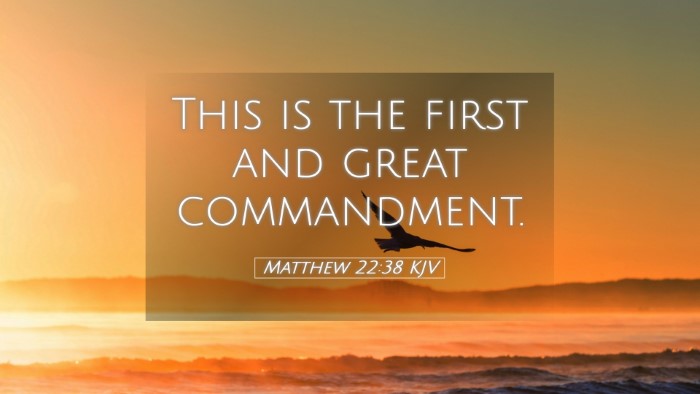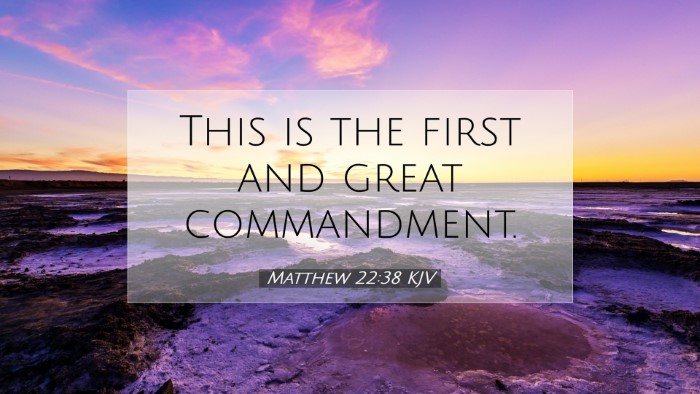Commentary on Matthew 22:38
Verse Text: "This is the first and great commandment." (Matthew 22:38)
In this verse, Jesus encapsulates the essence of the law and the prophets into a singular, pivotal commandment. The discourse surrounding this verse serves as a profound theological reflection on the nature of love, law, and the heart of God’s commandments.
Contextual Background
In Matthew 22, Jesus is confronted by the Pharisees who seek to trap Him with questions about the law. The inquiry about the greatest commandment arises from a conversation where the religious elite are attempting to undermine His authority. This moment highlights both the teaching of the Law and its ultimate fulfillment in Christ.
The Greatness of the Commandment
Matthew Henry provides insightful commentary by emphasizing that this commandment establishes the foundation of all moral duties. He states, "The love of God is the first and principal duty." This reflects the perspective that all other commandments stem from this primary directive to love God fully.
- Divine Relationship: Loving God is the fundamental relationship that undergirds the believer's life.
- Hierarchy of Commandments: This commandment supersedes all others, indicating priorities in the believer's ethical considerations.
The Nature of Love
Albert Barnes expands on this concept by noting that love is the disposition from which all obedience arises. He contends, “Love is the fulfilling of the law,” indicating that true adherence to God's commandments must be motivated by love. In this light, Jesus' proclamation highlights not only the action of loving but the heart from which such love flows.
- Loving God Wholeheartedly: This love must be comprehensive, engaging the whole heart, soul, and mind.
- Transformative Nature: Such love transforms the believer, aligning their desires with God's will.
Implications for Believers
Adam Clarke stresses that this commandment calls for a profound commitment. He declares that love for God must be above all else, which profoundly impacts how one lives in relation to others and oneself.
- Priority in Life: Believers are called to evaluate and realign their priorities, placing God at the center.
- Countercultural Love: The commandment challenges the norms of society that prioritize self-interest over divine love.
Further Theological Reflections
This verse invites deeper reflections on the nature of God and His expectations for humanity. The love commanded in this verse reflects both the relational aspect of God with humanity and His desire for an intimate connection. It invites believers into an exploration of what it means to love God fully.
Theological Significance
The implications of "the first and great commandment" can further be dissected from a theological standpoint. Matthew Henry suggests that understanding this commandment leads to a deeper comprehension of God's character—His holiness, love, and justice.
- God's Sovereignty: Acknowledging God's supremacy is essential in truly loving Him.
- Holistic Spirituality: The commandment calls for an all-encompassing devotion that touches every aspect of life.
Conclusion
In summary, Matthew 22:38 stands as a profound declaration of the believer's ultimate duty to love God above all else. This encapsulates the essence of the Christian faith and the fulfilling of the law. Pastors, students, theologians, and Bible scholars are invited to explore the breadth and depth of this commandment, examining both its implications for personal faith and its relevance for the community of believers. The call to love God fundamentally shapes the believer's identity and mission in the world.


